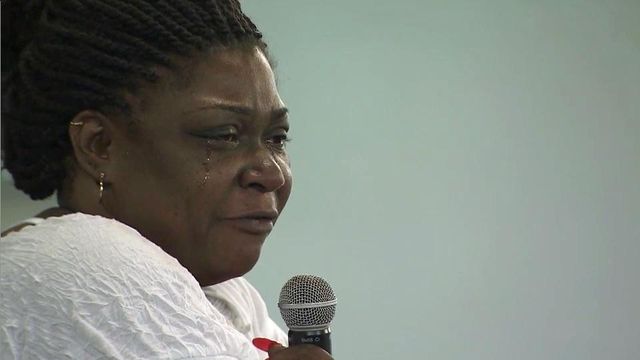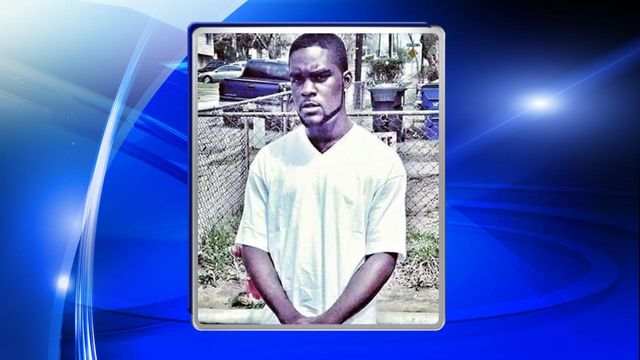Wake DA: Raleigh officer killed man in self-defense
A state investigation has concluded that a Raleigh police officer fired in self-defense when he shot and killed a man in February, Wake County District Attorney Lorrin Freeman said Wednesday, so no criminal charges will be filed in the case.
Posted — UpdatedSenior Officer D.C. Twiddy and Akiel Denkins were struggling, and Denkins was reaching for a gun when he was shot on Feb. 29, Freeman said.
"The evidence exonerates Officer Twiddy and makes it clear that he acted in self-defense, based on what we know at this time," she said.
Denkins' mother, Rolanda Byrd, who met privately with Freeman Wednesday morning before the district attorney released her report, said she was upset that Twiddy won't be held accountable for her son's death.
"His story – statement – says that he tussled with my son before he shot him," Byrd said. "Why didn't you Taser him at that point instead of waiting till it got to a point where you had to shoot my son and kill him?"
Twiddy, meanwhile, was relieved by Freeman's decision, said Rick Armstrong of the Raleigh Police Protective Association, which represents the officer.
"We were really pleased with the findings of the district attorney that Officer Twiddy acted in self-defense and he did what was right," Armstrong said, adding that Twiddy has been under tremendous stress in recent weeks.
Twiddy, 29, remains on administrative duty pending the outcome of a Raleigh Police Department investigation into whether any policies were violated.
"It's very stressful, but he’s ready to do back to work and do his duties as a police officer," Armstrong said.
The Wake County NAACP said their attorneys are still investigating the shooting and plan to go over the DA's report line by line.
Evidence that Denkins grabbed gun
Police have described Denkins, 24, as a drug suspect who was fleeing arrest when he was shot behind a home at 1117 S. East St., near the intersection of Bragg and East streets.
Twiddy, who is white, told State Bureau of Investigation agents that he had spotted Denkins, who was black, in a group of people on Bragg Street and knew there was an outstanding warrant for his arrest. So he parked his cruiser and called Denkins by name, but Denkins began to run, Twiddy told investigators.
The two men ran between some houses on East Street and hopped one fence, he said, and Denkins fell as he tried to climb over a second fence. Twiddy told investigators that he and Denkins then began struggling as he tried to take Denkins into custody, and he saw Denkins pull a handgun from his waistband. He said he ordered Denkins to drop the gun, and when he didn't, Twiddy pulled his own handgun and fired two rounds at Denkins.
Denkins then grabbed the barrel of Twiddy's handgun, so the officer pulled back and fired several more rounds until Denkins fell to the ground, he told investigators.
Authorities recovered seven .45-caliber shell casings from the shooting scene, which were later matched to Twiddy's gun, and a .38-caliber Smith & Wesson revolver, according to Freeman's report.
The Smith & Wesson, which was reported stolen from a Raleigh home in January, had Denkins' DNA on the grip, trigger and other areas, according to the report. Twiddy's DNA wasn't found on the gun, which had five rounds in it but wasn't fired during the confrontation, the report states.
Denkins' DNA also was found on the barrel of Twiddy's gun, the report states.
"We are fortunate in this case to have forensic evidence and physical evidence," Freeman said. "The forensic evidence on Officer Twiddy's gun confirms the fact that Mr. Denkins did in fact grab Mr. Twiddy's, Officer Twiddy's, gun."
An autopsy determined that Denkins had been shot four times – once in each arm, in the right shoulder and in the right chest – but medical examiners said they aren't able to determine the sequence of the wounds, the report states. Medical examiners said, however, that the wounds were consistent with Twiddy's account of the shooting, according to the report.
Denkins had cocaine in his system at the time of the shooting, according to toxicology tests.
Although the final autopsy report hasn't been issued, the report states, "No one involved in the autopsy or the investigation expects the final report to contain any significant information which would alter any pertinent findings already known."
Family disputes DA's decision
That conclusion doesn't satisfy Byrd, who questioned the location of the wounds her son suffered. Last month, a lawyer representing the family said an independent autopsy determined Denkins had been shot in the back.
"If you listen to how (Twiddy) said things, how he explained what happened, there has to be a question of how could this have happened because I had it, his father had it, his sister had it. My lawyer even has the same question – how?" Byrd said.
"It's just so much that happened in a matter of seconds, it makes no sense," said Denkins' sister, Shiquoia Johnson.
The SBI agents also interviewed 30 people who were in the neighborhood at the time of the shooting, according to the report. Only two people said they saw Twiddy shoot Denkins, but their accounts didn't match those provided by anyone else in the area or the physical evidence collected from the scene, Freeman's report states.
"This is a hard case for our community, there's no question about it," she said. "It is a tragedy, regardless of where you stand on the issue."
Irving Joyner, a law professor at North Carolina Central University and a lawyer for the North Carolina chapter of the NAACP, noted that Freeman's report states that no witnesses reported seeing Denkins with a gun before he ran from Twiddy. Along with other information gathered by supporters of Denkins' family, that leads Joyner to question the district attorney's findings.
"We are still trying to collect all the information, the data that’s been provided to the district attorney," Joyner said. "Once we’ve reviewed all that, as well as talk to other witnesses we’ve been looking for, we’ll make some decisions about what our next steps will be."
Byrd said Twiddy is the only person who knows the truth, and she doesn't believe she's heard it yet.
"He and my son were the only two behind that house that actually know exactly what went on," she said."I am going to fight until I can't fight no more for my son's statement to be heard."
Community calm urged
A prayer vigil was held Wednesday night at Bible Way Temple in Raleigh, in response to Freeman's decision.
The church was the site of community meetings in the days that followed Denkins' death. Although several protest marches were held, none of the demonstrations turned violent, as has happened in other cities after white police officers shot black men.
"The symbolism of the church is actually the place of solace, the place of serenity. When you have these type moments in your life, you need to have a place of prayer," said Bishop Darnell Dixon.
During the half-hour vigil, the southeast Raleigh community found sanctuary and continued to mourn Denkins' death.
"He has two beautiful young boys that have to live the rest of their life without their father and I have to be there to make sure they never forget who he was," said Byrd.
Byrd and other community leaders used the vigil to appeal for calm in the community. Dixon called on the community to express their anger and frustration over the DA's decision in peace and the community listened.
"This is the best way I can feel to speak for him, to show up for him," said Denkins' cousin Bobbette Cross.
"It's not about falling apart, it's about coming together and finding a way to address our issues," said family member Akiba Byrd.
Local officials on Wednesday praised community leaders for maintaining the calm throughout the investigation of the shooting, and Joyner called for the calm to continue.
"Our message to the community is that we are still looking at things. This is not the end of this by any stretch of the imagination. We will pursue this until we reach some final determination about what did happen," he said. "Rushing in anger to do something is not going to aid us in this process. Anger ought to help identify additional witnesses that we can talk to that may have more information to share than has been provided thus far."
"The Wake County DA's decision clears Officer Twiddy of wrongdoing but it does not end the community conversation," Mayor Nancy McFarlane said in a statement Wednesday. "Lives have been forever changed, and we are committed to building trust and strengthening relationships in Raleigh to ensure the health and safety of both our officers and the public."
"First and foremost, I thank the entire Raleigh community for the patience it displayed as the comprehensive process that began on Feb. 29 was under way," Police Chief Cassandra Deck-Brown said in a statement. "The loss of a life is always profoundly regrettable, and my heart goes out to everyone affected by the death of Akiel Denkins. As the healing process continues, my goal is to work with the Raleigh community to ensure that we all do everything we can to make such occurrences as unlikely as possible."
Freeman said more discussions about police interaction with the community are needed.
"There have been a lot of discussions in our community already about community and how police interact with the community and what should happen following a police-involved shooting. I think those are important discussions," she said. "I would hope the community is able to do that in a constructive way and we are able to come back together at the end of this and work together to move forward."
• Credits
Copyright 2024 by Capitol Broadcasting Company. All rights reserved. This material may not be published, broadcast, rewritten or redistributed.






